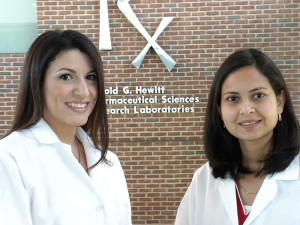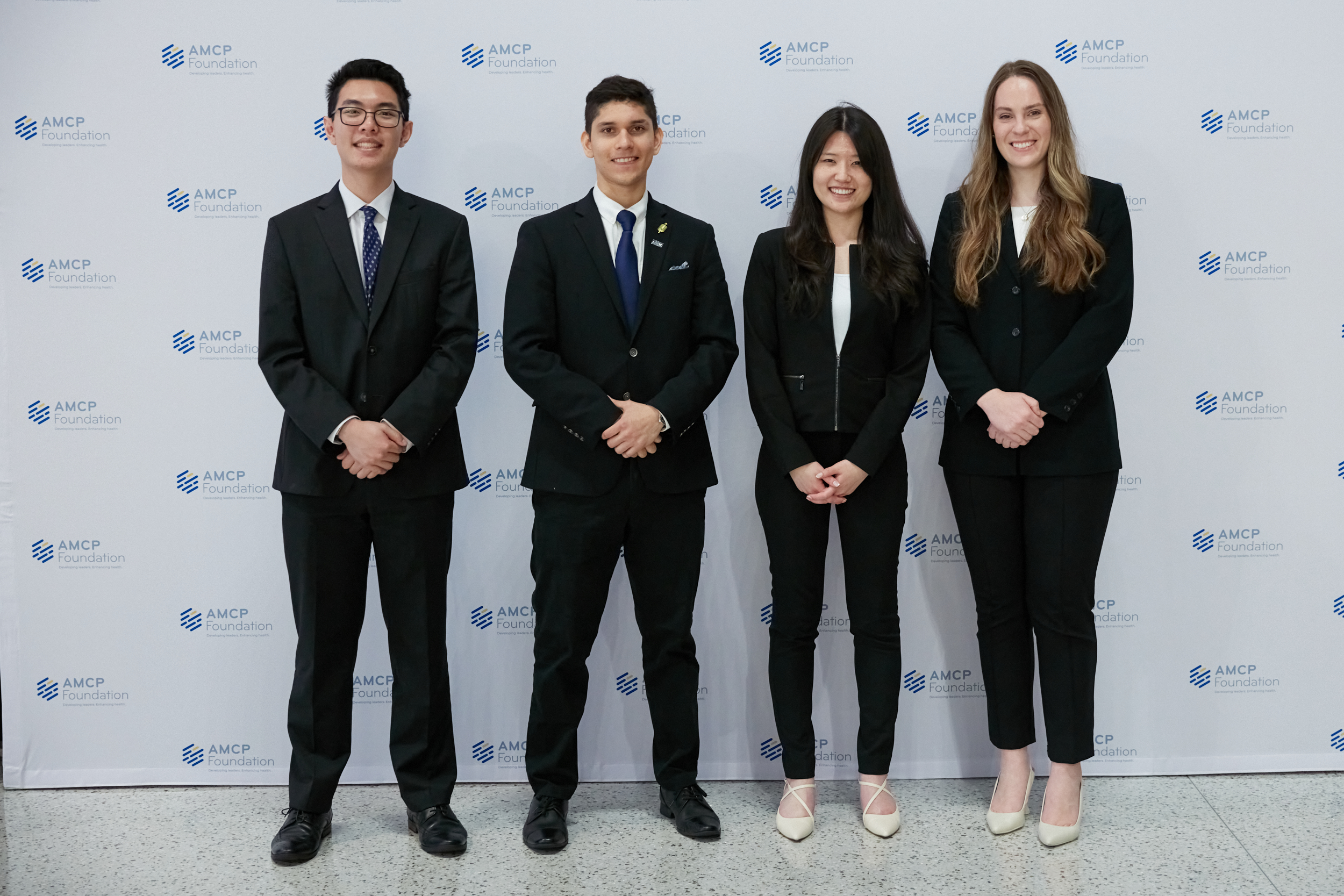
Graduate students in the UConn School of Pharmacy are learning about more than just molecules and chemical structure – they’re pursuing research that may one day lead to more efficient and effective drugs.
Two of these students – Kristyn Greco and Archana Rawat – were recognized recently for their research by the United States Pharmacopeia (USP).
Each year, the USP awards six fellowships of $25,000 to graduate students enrolled in chemistry, pharmacy, or other related doctoral programs nationwide, in order to help support research that may yield results impacting the medical and food industries. Greco and Rawat were among the six fellowship recipients this year.
Greco received her undergraduate degree in chemical engineering in 2001 from Northeastern University in Boston and spent the next three years working for a pharmaceutical company before she realized that she wanted to go to graduate school to develop her craft. Accepted into the School of Pharmacy, she began working in the lab of associate professor Robin Bogner in 2004, where she became interested in studying the dissolution of potential drugs.
For a drug to be effective, it needs to be incorporated into your bloodstream, explains Greco.
“This research is important because a lot of drugs being developed today have really low dissolution rates and really low solubility, which in turn lead to reduced effectiveness,” she says. “In order to increase effectiveness, we’re aiming to increase solubility and increase dissolution rates.”
The drugs that Greco is currently studying have high solubility rates but, based on physiological conditions such as when the drugs enter the stomach or intestines, they can convert to low solubility forms, thereby reducing effectiveness.
Greco’s research deals with drugs just after they have been synthesized or discovered; as such, she is on the frontlines of drug development. One goal of her research is to help researchers further down the production line determine which drugs will stay in solution and be effective during treatment. She also hopes that her research can help develop techniques that will keep drugs in solution (through the development of new coatings, for example), and that it will help researchers determine which form of a drug is most effective for its given purpose, be it pill, capsule, intravenous injection, or some other form.
This project is an extension of one she led in 2007, which was also funded by USP. Greco would like to apply the science she’s learned in a practical way, and is planning for a career working for a pharmaceutical company where she can continue to develop new drugs.
At the same time, she hopes to pass along her love of learning and research to future generations of scientists.
“Be persistent,” says Greco to the undergraduate students she works with. “Nothing is trivial in nature; nothing is trivial in science. Sometimes you’ll think an experiment is going to work and that you’ll have all the answers and it won’t. You’ll be frustrated, but you have to just keep pushing on. That’s the hardest part, but it makes finding the answers that much more rewarding.”
Rawat received her undergraduate degree in pharmacy and master’s degree in pharmaceutics from the University of Delhi in India and worked for a while at a drug company before coming to UConn in 2005 to pursue her Ph.D. Accepted into Professor Diane Burgess’s lab, Rawat became involved in studying controlled-release microsphere formulations.
Microsphere formulations are delivery systems used to prolong the duration of a drug’s release in the body, explains Rawat, whose research has garnered two other fellowships from USP. Her current research is an extension of those past fellowships.
“Conventional methods of drug release that are available today – pills, capsules, tablets – must be taken once a day, twice a day, thrice a day” in order to maintain effective levels of a medication, she says. “Microspheres are a form of long-term drug release, and so one injection into the body can provide a continuous, steady, and controlled release for anywhere between one and four months, depending on the formulation used and the disease being treated.”
These formulations are particularly well-suited for patients who must take frequent doses of a medication over a long period of time, such as those suffering from schizophrenia, growth-hormone deficiencies, or certain forms of cancer. These diseases are best treated with steady streams of medication, and so microsphere formulations prove invaluable to patient well-being, says Rawat.
Pills, capsules, and tablets, even if they are time-releasing compounds, can result in fluctuating blood levels of whatever drug they are delivering. Microspheres combat this problem by maintaining constant drug levels in a patient’s blood stream over the course of the treatment, thereby increasing efficacy of the drug.
The medications are also helpful to patients who may be traveling or who may forget to take their medications. Ease of use leads to higher rates of patient compliance.
There are currently few microsphere formulations that have been approved by the FDA. Rawat’s research involves developing methods to test new microsphere formulations, because it is important for researchers to know how each formulation will perform in the body.
After completing her doctorate, Rawat intends to pursue a career in industrial research so that she can put her knowledge and education to good use in developing new and effective drugs. Research is something she has always loved, and she credits at least part of her success to that passion.
“A student should pursue a career that they enjoy,” she advises current students, particularly those who are preparing to graduate. “Be honest, have interest in what you are doing, and work hard, and you’ll have success no matter what field you choose to go into.”


